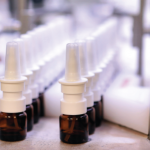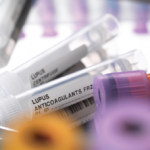
kentoh/shutterstock.com
CHICAGO—A lupus expert recently issued a call for action to improve outcomes of lupus clinical trials, a field that has had so many failed potential therapies that he said it seems to be “cursed.”
Richard Furie, MD, chief of rheumatology at Northwell Health in New York, said at the ACR’s 2016 State-of-the-Art Clinical Symposium that the field has had “just three wins, and I can’t tell you how many losses.”
The three achievements he counted are the BLISS-52 and BLISS-76 (Belimumab in Subjects with Systemic Lupus Erythematosus) trials, which led to the approval of belimumab, and the maintenance phase of ALMS (Aspreva Lupus Management Study), which found that mycophenolate mofetil was superior to azathioprine for lupus nephritis (LN) maintenance therapy.1,2
He did acknowledge that another highlight has been the revival of hydrochloroquine, which had previously been administered primarily to lupus patients with arthritis or rash, but has been found to have benefits in a lot of different domains, including lowering lipid levels, preventing thrombosis, preventing flares and improving survival. It is now considered essential for any lupus patient.
But the response rates in SLE and LN clinical trials with the available drugs have generally been quite low—ranging from 16–43% in SLE and from the single digits to 30% in LN.
“There are major unmet needs,” Dr. Furie said. “I think the biggest need is actually in lupus nephritis, but severe extra-renal lupus also needs to be targeted in order to reduce damage from the disease, as well as from the background therapies.”
He reviewed the failures and promises in a variety of approaches in the treatment of SLE and LN:
DNA/RNA/Toll-Like Receptors

Dr. Furie
Among the failed therapies in lupus include an attempt 15 years ago to “chew up the apoptotic garbage” seen in the disease. The idea was that if one can reduce the amount of circulating DNA released from apoptotic cells, one could prevent the inflammatory cascade that leads to disease. But that didn’t get past Phase 1. An effort to resurrect this idea, but targeting RNA, is now underway.
Another failed effort was a small study on toll-like receptors that also didn’t get past Phase 1, although Dr. Furie said there’s more to be done with this approach.
Interferon
One of the more promising strategies, he said, is to disrupt the effects of type I interferons, which are elevated in lupus patients. In fact, about 75% of lupus patients have interferon gene signatures, which could become a useful biomarker, Dr. Furie said.
One approach is to use interferon-alpha to immunize patients so they develop their own antibodies to it. This is now in early- to mid-stage development.
Another strategy has been to specifically target interferon-alpha with monoclonal antibodies, of which there are three such products: rontalizumab, which was studied in a failed trial; sifalimumab, which has generated “some excitement” despite response rates of only about 15% with the highest dose studied; and AGS009, which has been through Phase 1.
A broader effect on the type I interferon pathway occurs with anifrolumab, an antibody that binds to the receptor for all type I interferons. A response rate of 26% above placebo in SLE patients was observed in a Phase 2 trial.
Still another product, in Phase 1 development, is an antibody that reacts with BDCA2, a molecule on plasmacytoid dendritic cells that are the chief producers of interferons.
B Cells & T Cells
A large Phase 3 trial of an antibody to CD22 ended in a failure, as did trials of two antibodies to CD20, one in SLE and another in LN—although Dr. Furie said “we’re still believers in targeting B cells.”
There are now about 5 trials going on studying rituximab, an anti-CD20 antibody. Plus, Dr. Furie and others are working on an LN trial of obinutuzumab, which is a third-generation anti-CD20 antibody, and seemingly the most potent.
Another highlight has been the revival of hydrochloroquine, which had previously been administered primarily to lupus patients with arthritis or rash, but has been found to have benefits in a lot of different domains, including lowering lipid levels, preventing thrombosis, preventing flares & improving survival.
BLyS Pathway
Still another strategy is to inhibit essential growth factors for B cells through inhibition of the BLyS-APRIL pathway. Belimumab works in this way, and is now FDA approved. But this approach, too, has ended with failed trials, including Phase 3 trials of tabalumab, a Phase 2 trial of blisibimod and Phase 2 trials of atacicept, although development of blisibimod and atacicept continues, Dr. Furie said.
He said the mixed results with the BLyS inhibitors are perplexing.
“Why do certain ones work and other ones fail? I don’t know,” he said. But he added that he suspected that, in some cases, the doses being used may have been too low.
Trials studying drugs that are intended to interfere with the B cell–T cell interaction have ended without success as well.
Cytokines
These are a potential target, but two interleukin (IL) 6 blockers so far—sirukumab and a product known as PF-04236921—have failed. The IL-6 receptor blocker tocilizumab seemed to improve arthritis but was associated with neutropenia.
Better Research Needed
Changes are needed to generate better results, Dr. Furie said. He called for better pre-clinical models and observational studies and short, small early clinical trials that don’t require very many patients.
“We need to target multiple pathways,” he said. “I think as complicated as rheumatoid arthritis is, there are probably many more pathways that are active in lupus. But the reality of it is, you need to get one drug before you can start studying combination biologics.”
He said the field also needs better trial participation from patients. Patients must be proactive in helping to get safer and more efficacious drugs to market.
“Despite the complexities of studying lupus, I am optimistic about the future,” he said. “I think it’s just a matter of time. We will have many more medicines. We will have biomarkers. We will someday have individualized therapy, and we will no doubt have better outcomes for our patients with lupus.”
Thomas R. Collins is a freelance medical writer based in Florida.
References
- Navarra SV, Guzman RM, Gallacher AE, et al. Efficacy and safety of belimumab in patients with active systemic lupus erythematosus: A randomised, placebo-controlled, phase 3 trial. Lancet. 2011 Feb 26;377(9767):721–731.
- Furie R, Petri M, Zamani O, et al. A phase III, randomized, placebo-controlled study of belimumab, a monoclonal antibody that inhibits B lymphocyte stimulator, in patients with systemic lupus erythematosus. Arthritis Rheum. 2011 Dec;63(12):3918–3930.
- Dooley MA, Jayne D, Ginzler EM, et al. Mycophenolate versus azathioprine as maintenance therapy for lupus nephritis. N Engl J Med. 2011 Nov 17;365(20):1886–1895.



